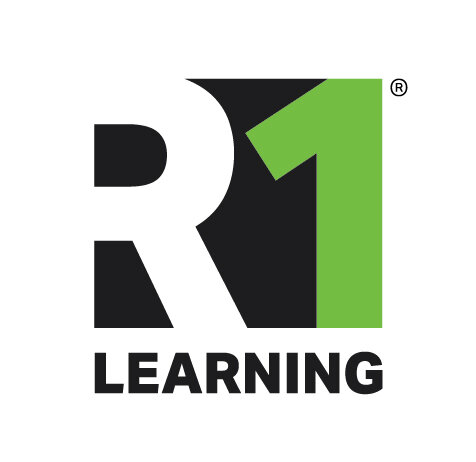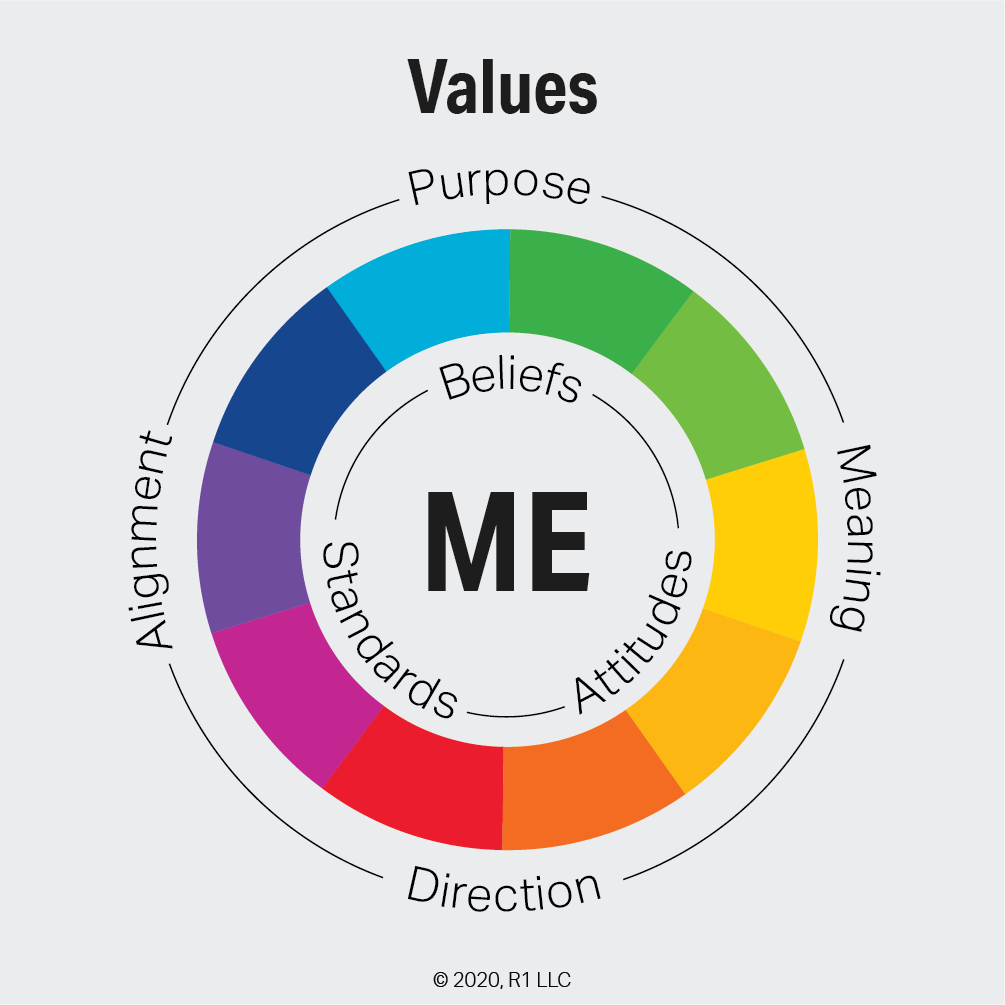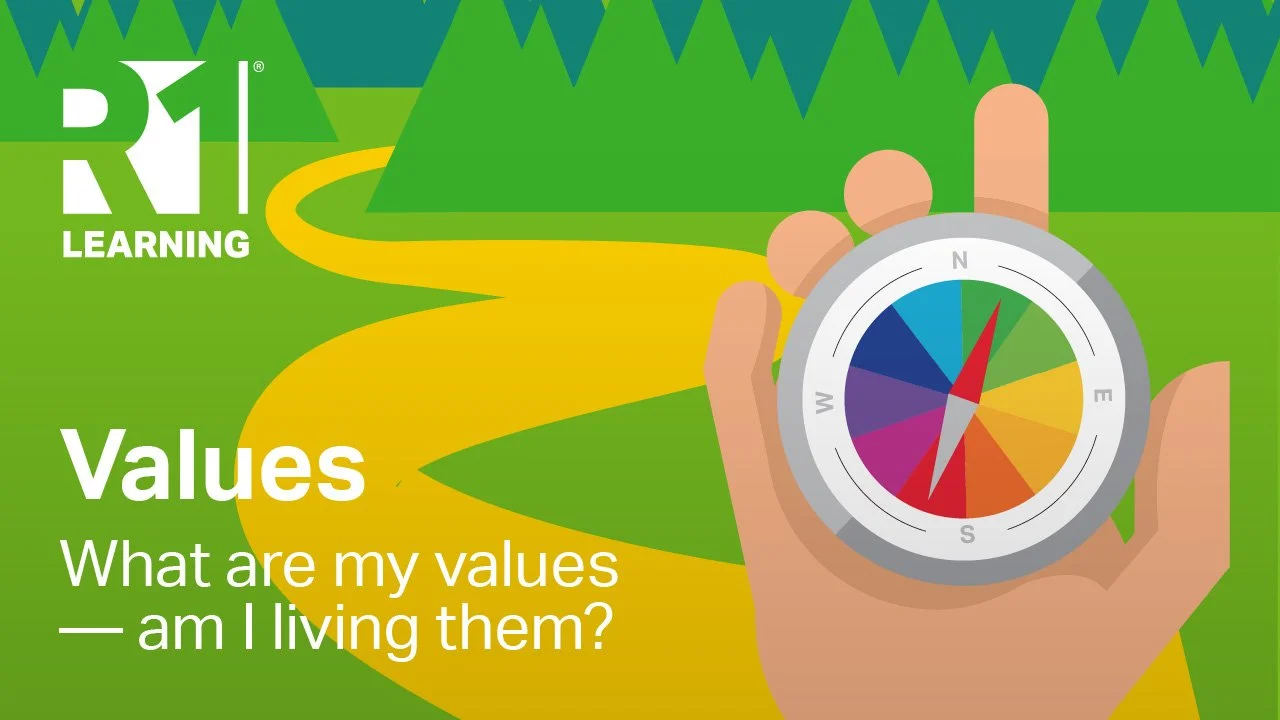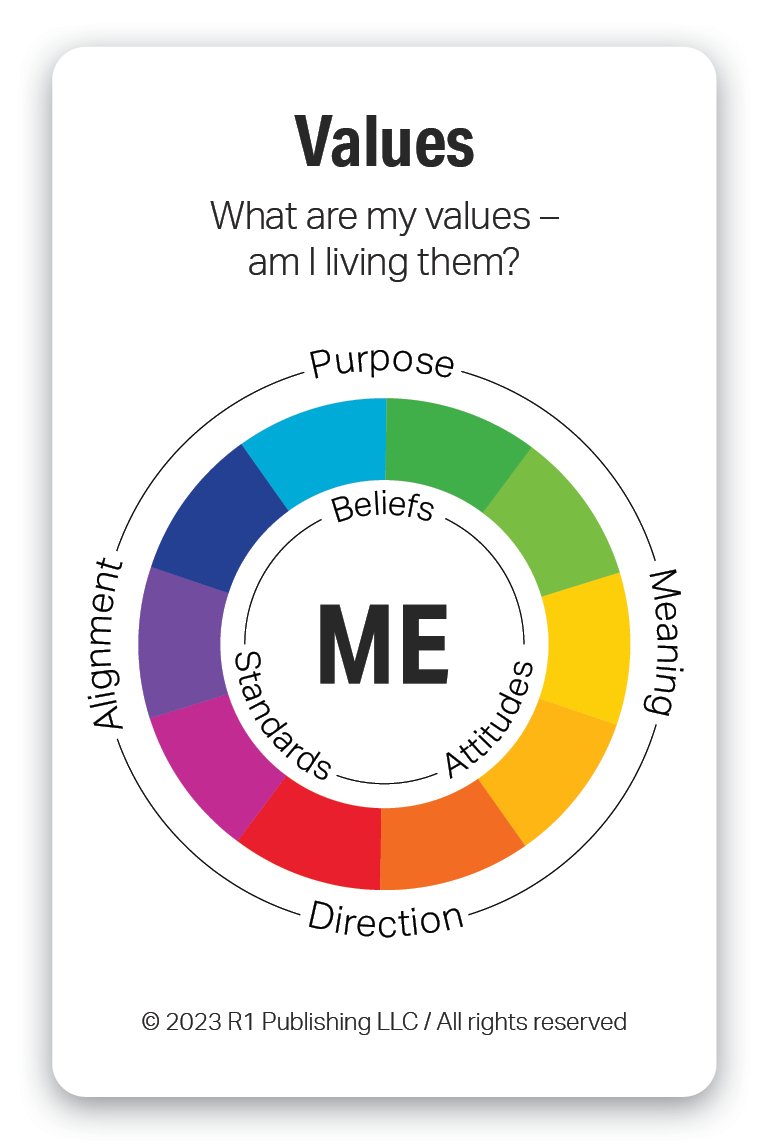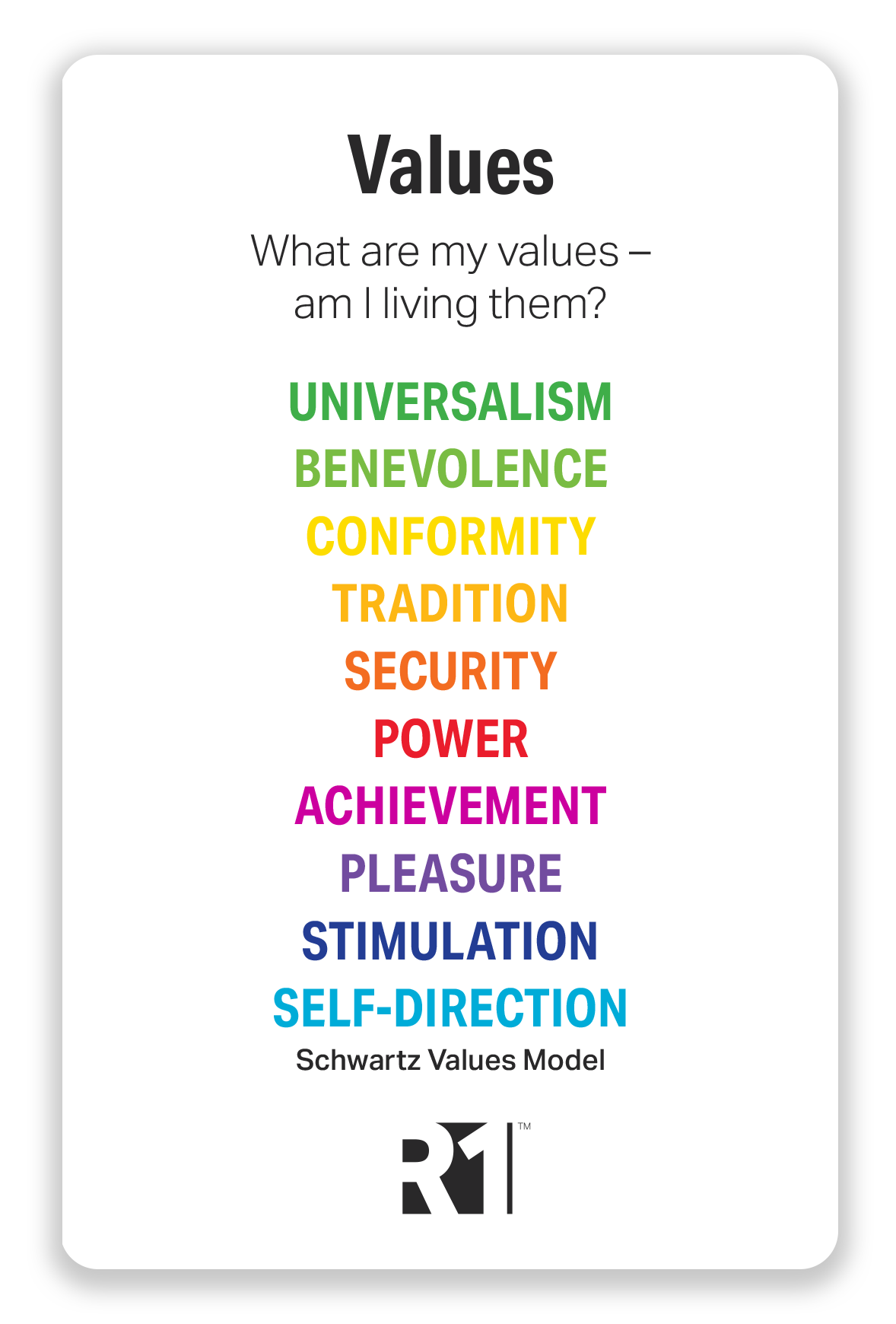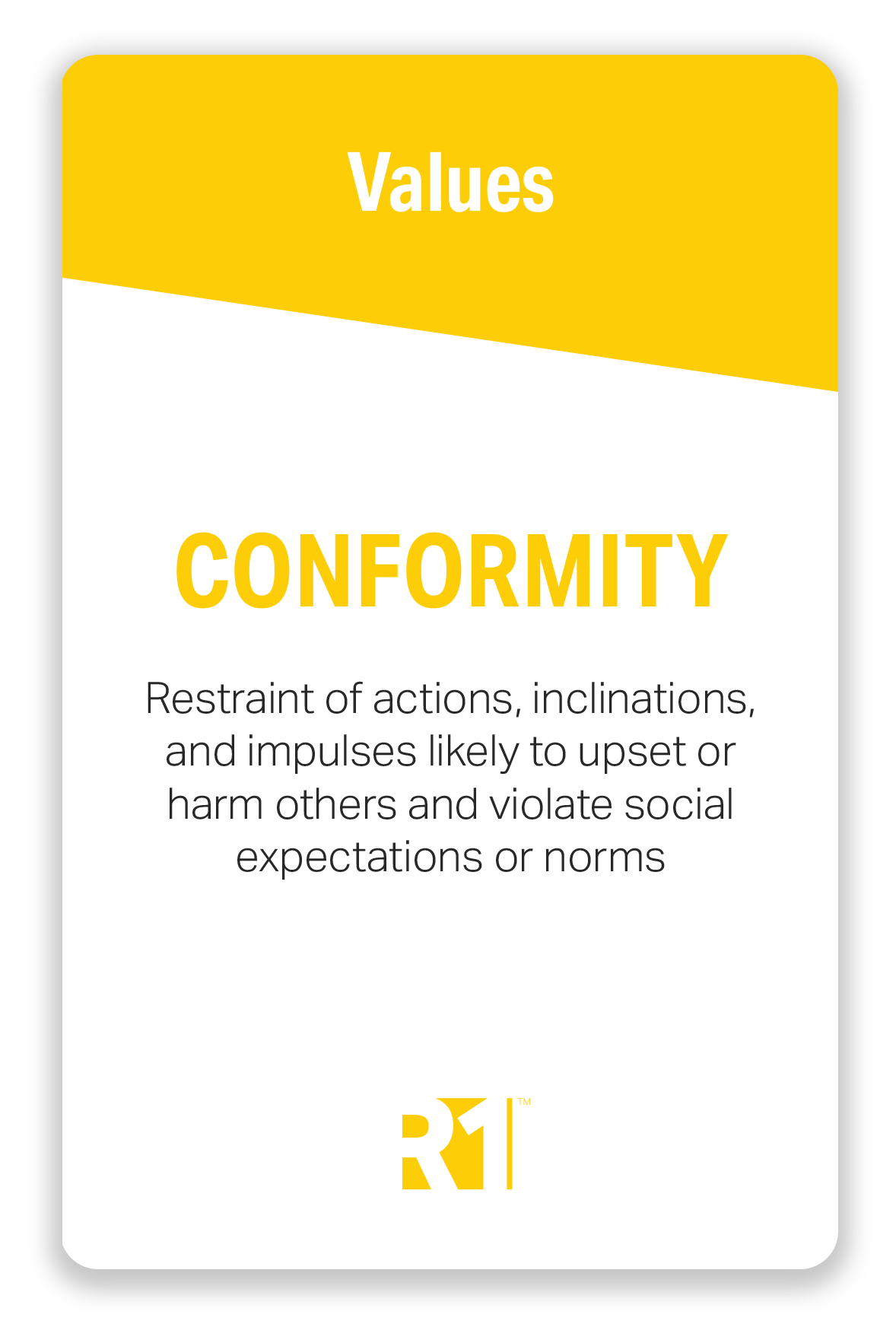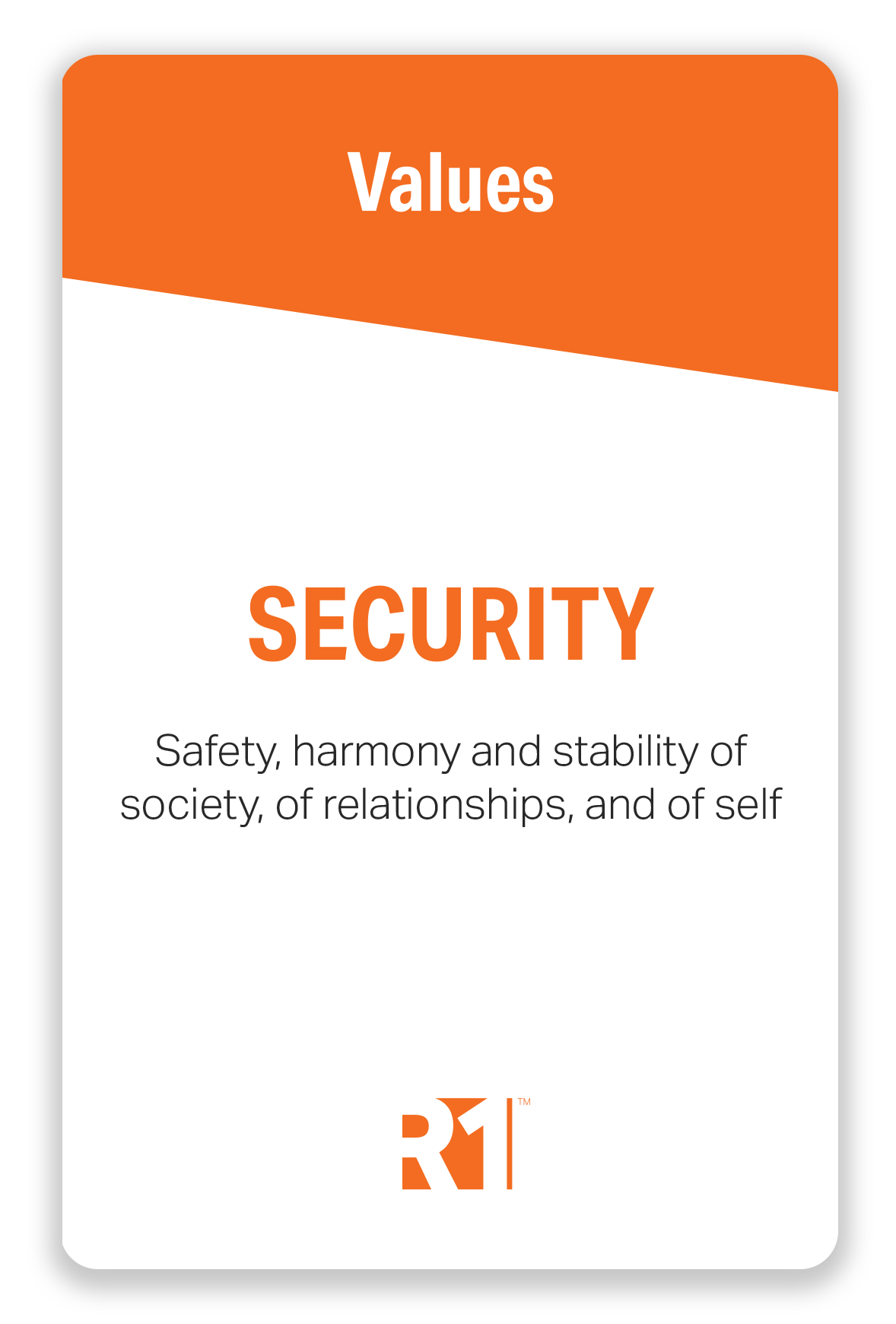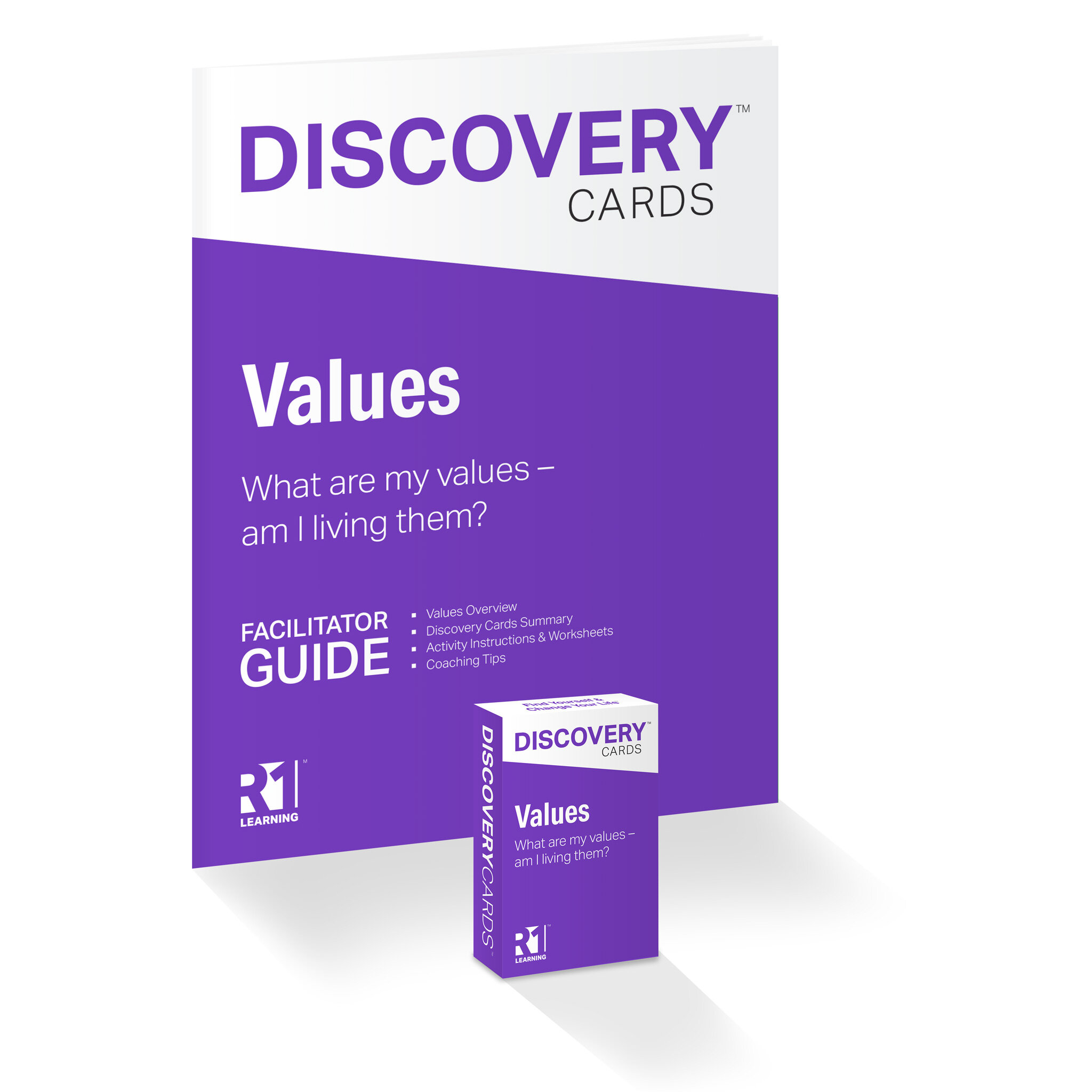10 Values Types and How They Motivate Behavioral Change
The Importance of Values. Values have been a central concept in psychology and the social sciences since the inception of the fields. Values also play an important role in economics, education, and related disciplines. They are used to characterize groups and individuals; to trace change over time and to explain the motivational bases of behavior. They provide purpose, meaning, and direction.
Values are the fundamental beliefs that guide and motivate our behavior and our choices of what is important in life. They are standards we use to observe, evaluate, and respond to our environment at any level – the world as a whole, our country, city, town, community, workplace, school, family, or other social groups. Living in sync with one's values promotes health and wellness. Living out of balance with values can be a source of stress and anxiety and lead to physical, emotional, or mental health issues.
The Schwartz Values Theory
The Nature of Values. When we think of values, we think of what is important in life. Each person can hold different values and with varying degrees of importance. The Schwartz Values Theory provides a model of values that defines six main features:
Values are inextricably linked to affect. When values are activated they become infused with emotions and feelings.
Values define the desirable goals that motivate action.
Values transcend specific actions, time, and situations.
Values serve as standards or criteria to guide the choice and evaluation of thoughts, behavior, and environmental factors related to people, places, things, and situations.
Values are ordered by relative importance. Personal values form an ordered system of priorities that characterize people as individuals.
The relative importance of personal values guides action. Any attitude or behavior typically has implications for more than one value.
These are the features of all values. What distinguishes one from another is the type of goal or motivation that it expresses.
Most change theories include an evaluation process in which individuals look to social and personal standards to guide and motivate behavior. Values, character traits, and even skills one has acquired or aspires to learn can serve this purpose.
Explore R1 Discover — Interactive Engagement Tools
Values Types and Values — Defining What Motivates Us
Values are beliefs about what is and isn’t important in life. They underlie attitudes and appraisals of people and serve as standards to motivate behavior
The Schwartz Values Theory defines ten broad Value Types according to the kind of goal or motivation that each expresses. These Value Types have been heavily researched and applied in studies of over seventy cultures across the world from 1987 through today. Each Value Type defines socially desirable standards used to represent the basic goals cognitively and the vocabulary to communicate with others about them.
The Schwartz Values Model provides a list of fifty-seven (57) color-coded, concrete, and explicit values that have been chosen as examples of each Value Type. R1 Learning has adopted this model in its basic form so educators, practitioners, individuals, and family members can use it across a variety of applications. Below is a list of the ten Schwartz Values Types with examples of specific values for each. All are written as motivational goals. The thirty (30) bulleted values below are a subset of the fifty-seven (57) values listed in the Discovery Cards deck and Facilitator Guide. Use the list below to think about your own values and then answer the Questions to Explore below.
Universalism: Understanding, appreciation, tolerance, and protection for the welfare of all people and for nature. Discovery Cards examples include:
A world at peace — Free of war and conflict
Broad-mindedness — Tolerance of different ideas and beliefs
Social justice — Addressing injustice, care for the vulnerable, fairness
Benevolence: Kindness toward people with whom one is in frequent personal contact, enhancing and preserving their welfare. Discovery Cards examples include:
Forgiveness — Willingness to pardon others
Honesty — Genuineness, sincerity
True friendship — Close, supportive friends
Conformity: Restraint of actions, inclinations, and impulses likely to upset or harm others and violate social expectations or norms. Discovery Cards examples include:
Compliance — Following rules, meeting obligations, duty
Politeness — Courtesy, good social skills
Self-discipline — Self-restraint, resistance to temptation
Tradition: Respect, commitment and acceptance of the customs and ideas that traditional culture or religion provide the self. Discovery Cards examples include:
Accepting life as it is — Submitting to life's circumstances
Humility — Modesty, self-effacing
Moderation — Avoiding extremes of feeling and action
Security: Safety, harmony and stability of society, of relationships, and of self. Discovery Cards examples include:
Family security — Safety for loved ones
Health — Absence of physical or mental concerns
Sense of belonging — Feeling that others care about me
Power: Social status and prestige, control or dominance over people and resources. Discovery Cards examples include:
Authority — The right to lead or command
Social recognition — Status and respect from others
Wealth — Material possessions, money
Achievement: Personal success through demonstrating competence according to social standards. Discovery Cards examples include:
Influence — Having an impact on people and events
Success — Achieving goals
Self respect — Belief in one's own worth
Pleasure: Pleasure and sensuous gratification for oneself. Discovery Cards examples include:
Enjoying of life — Enjoyment food, relaxation, leisure, etc.
Pleasure seeking — Gratification of desires
Self-indulgence — Doing pleasurable things
Stimulation: Excitement, novelty, and challenge in life. Discovery Cards examples include:
A varied life — Filled with challenge, novelty, and change
An exciting life — Stimulating experiences
Daring — Seeking adventure, risk-taking
Self-Direction: Independence of thought and action. Discovery Cards examples include:
Creativity — Imagination, inventiveness, originality
Curiosity — Interested in everything, exploring
Independence — Self-reliance, autonomy
We have included the Schwartz Values Wheel on pages 10 and 11 of the R1 Values Facilitator Guide which highlights additional dimensions of this model with referenced articles so that you can explore it further. Additional resources on values related to behavioral health are also listed in the guide and at the end of this post.
So How Do Values Motivate Behavioral Change?
There are several theories in psychology and sociology that highlight the central nature of social standards as a driver for behavioral alignment with social groups. Individuals seek information by which to compare themselves and their behavior and make changes as needed. For example, Social Cognitive Theory defines a set of psychological processes that are developed and mobilized for self-directed change. (Bandura, 1986)
Self-Observation – The cognitive process of a person observing and monitoring themselves as they work towards their goals (Zimmerman, 2001)
Self-Evaluation – The process of a person cognitively comparing their performance to the performance needed to achieve their goals (Bandura, 1991)
Self-Regulation – The cognitive process a person goes through in which they modify their behavior based on their evaluation of progress towards their goals (Bandura, 1991)
Social Cognitive Theory proposes that individuals do not simply respond to environmental influences, but rather they actively seek and interpret information (Nevid, 2009). Individuals “function as contributors to their own motivation, behavior, and development within a network of reciprocally interacting influences” (Bandura, 1999).
Values as Motivational Goals: As indicated above, standards are at the center of both setting goals and evaluating performance in the change process. When applied to values, if an individual’s behavior is acceptable and in alignment with social standards, the behavior is rewarded and reinforced. If the behavior is not in alignment with these standards, individuals find themselves outside of the social norms and typically get feedback or have consequences for their undesirable behavior. For example, if someone is dishonest in their interactions with other individuals (the value of Honesty), individuals may choose not to engage in a relationship with this person for reasons of mistrust or fear of being manipulated or taken advantage of. Values provide a construct by which to identify and evaluate one’s own standards within the context of social norms and set goals that motivate them toward new behavior. Character Traits also serve this purpose and are one of the core concepts used in 12 Step programs. The Schwartz Values Model provides a researched, concrete set of values to use as standards for the purpose of identifying and evaluating goals. This vocabulary provides the structure for individuals to process these ideas on their own. It also gives individuals and groups a common vocabulary to assess and express these ideas with others. Observing one’s behavior, evaluating standards, and choosing new responses is at the heart of the R1 Learning System. Learn more about the R1 Learning Process and How Do I Build The Skills for Change? in our earlier post.
Questions to Explore
Answer these questions for yourself or someone you are working with.
Did you find the Schwartz Values Model helpful in thinking about and identifying values?
Did the Values Types help you to better pinpoint specific values? How were these categories helpful?
Which Values Types were most prominent in your list? Does this make sense?
As you look back over past challenging situations or circumstances, how have you ever compromised your values? Explain.
Which specific values do you think will be most important for the future?
What actions can you take to live each of these values more fully today and in the future?
Who can you ask for help and support?
Thank you for reading this post and participating in this activity. Contact us if you would like to learn more about Values or the R1 Learning System. We look forward to hearing from you.
References
Schwartz, S. H. (1992). Universals in the content and structure of values: Theory and empirical tests in 20 countries. In M. Zanna (Ed.), Advances in experimental social psychology (Vol. 25) (pp. 1-65). New York: Academic Press. doi.org/10.1016/S0065-2601(08)60281-6
Schwartz, S. H. (2012). An overview of the Schwartz theory of basic values. Online Readings in Psychology and Culture, 2(1). doi.org/10.9707/2307-0919.1116
Schwartz, S. H. (2017). The refined theory of basic values. In S. Roccas & L. Sagiv (Eds.), Values and behavior: Taking a cross-cultural perspective (pp. 51-72). Cham, Switzerland: Springer International Publishing.
Copyright 2023 R1 Publishing LLC / All Rights Reserved. Use of this article for any purpose is prohibited without permission.
Engage and Retain Clients. Train and Retain Your Team.
Values, What are my values – am I living them? The R1 Learning System and the Discovery Cards provide a unique opportunity to uncover and evaluate values important in people’s lives and use those insights to promote overall wellness. Our goal is to help individuals explore their values, uncover what’s important for them today, assess areas of alignment, gaps, or conflicts, and make new choices that enable them to live their values more fully.
Values Discovery Cards and Group Kits
Integrating these tools into your groups will allow individuals to build their own vocabulary, think about these concepts concretely, and put their choices into action. Visit the R1 Store to learn more about a variety of topics. The Discovery Cards are an amazing tool for exploring these topics with individuals or groups.
Here are a few ideas to help you learn more about R1 and engage others on this topic:
Share this blog post with others. (Thank you!)
Start a conversation with your team. Bring this information to your next team meeting or share it with your supervisor. Change starts in conversations. Good luck! Let us know how it goes.
Visit www.R1LEARNING.com to learn more about R1, the Discovery Cards, and how we’re creating engaging learning experiences through self-discovery.
